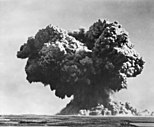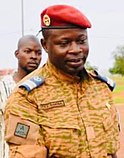Wikipedia:Main Page history/2022 October 3b
From today's featured article
Operation Hurricane was the first test of a British atomic device, detonated on 3 October 1952 in the lagoon in the Montebello Islands in Western Australia. During the Second World War, Britain commenced a nuclear weapons project, known as Tube Alloys, but the 1943 Quebec Agreement merged it with the American Manhattan Project. Several key British scientists worked on the Manhattan Project, but after the war the Americans ended cooperation. In January 1947, a cabinet sub-committee decided to resume efforts to build nuclear weapons. To test the effects of a ship-smuggled atomic bomb on a port (a threat of concern to the British at the time), the bomb was exploded inside the hull of a frigate, HMS Plym, leaving a saucer-shaped crater on the seabed 6 metres (20 ft) deep and 300 metres (1000 ft) across. With the success of Operation Hurricane, Britain became the third nuclear power, after the United States and the Soviet Union. (This article is part of a featured topic: Nuclear weapons and the United Kingdom.)
Did you know ...
- ... that in being hired as a newscaster for ATB, Bertha Acarapi (pictured) became one of Bolivia's first high-profile chola indigenous presenters?
- ... that Boost! won a temporary restraining order against Mead Johnson, after claiming it had infringed on their trademarks?
- ... that the Peruvian Civil Guard officer Mariano Santos Mateo was nicknamed the Brave Man of Tarapacá because he captured a banner of a Chilean military unit during the Battle of Tarapacá?
- ... that Oglethorpe County High School worked with the University of Georgia to bring their dropout rate from 65 dropouts in 1985–86 to just 4 in 1987–88?
- ... that Taylor Swift said she wrote "Should've Said No" to address her "dramatic and crazy" experience?
- ... that until a 1982 legal decision, women were not permitted to stand at the bar at El Vino in London?
- ... that OPTi Inc. won a patent suit against Apple for unauthorized use of "predictive snooping" technology?
- ... that the "Temple of Humanity" hosted underwear companies?
In the news
- In Malang Regency, Indonesia, at least 125 people are killed in a human crush at an association football match.
- In Burkina Faso, a coup d'état led by Ibrahim Traore deposes interim president Paul-Henri Sandaogo Damiba (pictured).
- Russia annexes the partially occupied Ukrainian oblasts of Luhansk, Donetsk, Zaporizhzhia and Kherson after widely condemned referendums.
- Hurricane Ian impacts Cuba and the United States, leaving at least 87 people dead and millions without power.
- After the general election in Nauru, Russ Kun is sworn in as President.
On this day
- 1792 – Spanish forces departed Valdivia to suppress the indigenous Huilliche uprising in southern Chile.
- 1849 – American author Edgar Allan Poe was found delirious in a gutter in mysterious circumstances; it was the last time he was seen in public before his death four days later.
- 1951 – The First Battle of Maryang-san, widely regarded as one of the Australian Army's greatest accomplishments during the Korean War, began.
- 1962 – Mercury-Atlas 8, the fifth United States crewed space mission, was launched from Cape Canaveral Air Force Station in Florida, carrying astronaut Wally Schirra (pictured).
- 1981 – A hunger strike by Irish republican prisoners at HM Prison Maze outside Belfast, Northern Ireland, ended after seven months and ten deaths.
- A. Y. Jackson (b. 1882)
- Charles Duke (b. 1935)
- Olivia Shakespear (d. 1938)
From today's featured list

There are 42 entries of shrine structures designated as National Treasures of Japan. The term "National Treasure" has been used in Japan to denote certain cultural properties since 1897. The number of Shinto shrines in Japan today has been estimated at more than 150,000, with single-structure shrines being the most common. Shrine buildings might also include oratories, purification halls, offering halls called heiden (between honden and haiden), dance halls, stone or metal lanterns, fences or walls, torii, and other structures. Shrine structures were designated national treasures when the Law for the Protection of Cultural Properties was implemented on June 9, 1951. As such they are eligible for government grants for repairs, maintenance, and the installation of fire-prevention facilities and other disaster-prevention systems. The shrine structures designated as national treasures date from the 12th-century Classical Heian period (example pictured) to the early modern 19th-century Edo period. (Full list...)
Today's featured picture

|
La Navarraise is an opera in two acts by Jules Massenet to a French libretto by Jules Claretie and Henri Caïn, based on Claretie's short story La cigarette (1890). This poster, for the French première at the Théâtre de l'Opéra-Comique on 3 October 1895, features Emma Calvé in the role of Anita. Photograph credit: Reutlinger family; restored by Adam Cuerden
Recently featured:
|
Other areas of Wikipedia
- Community portal – The central hub for editors, with resources, links, tasks, and announcements.
- Village pump – Forum for discussions about Wikipedia itself, including policies and technical issues.
- Site news – Sources of news about Wikipedia and the broader Wikimedia movement.
- Teahouse – Ask basic questions about using or editing Wikipedia.
- Help desk – Ask questions about using or editing Wikipedia.
- Reference desk – Ask research questions about encyclopedic topics.
- Content portals – A unique way to navigate the encyclopedia.
Wikipedia's sister projects
Wikipedia is written by volunteer editors and hosted by the Wikimedia Foundation, a non-profit organization that also hosts a range of other volunteer projects:
-
Commons
Free media repository -
MediaWiki
Wiki software development -
Meta-Wiki
Wikimedia project coordination -
Wikibooks
Free textbooks and manuals -
Wikidata
Free knowledge base -
Wikinews
Free-content news -
Wikiquote
Collection of quotations -
Wikisource
Free-content library -
Wikispecies
Directory of species -
Wikiversity
Free learning tools -
Wikivoyage
Free travel guide -
Wiktionary
Dictionary and thesaurus
Wikipedia languages
This Wikipedia is written in English. Many other Wikipedias are available; some of the largest are listed below.
-
1,000,000+ articles
-
250,000+ articles
-
50,000+ articles




